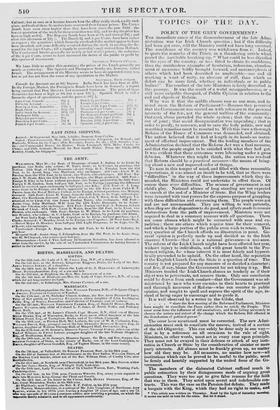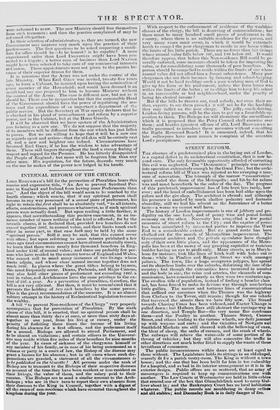TOPICS OF THE DAY.
POLICY OF THE GREY GOVERNMENT.* THE immediate cause of the dismemberment of the late Admi- nistration was the Irish Church question ; but if this difficulty had been got over, still the Ministry could not have long survived. The confidence of the country was withdrawn from it. indeed, to quote the remarks of the 7'imes, in a thundering article which pealed the inevitable breaking-up, " What could be less dignified in the eyes of the country, or less fitted to obtain its confidence, than the numberless examples of hesitation, indecision, abandon- ment of measures boldly brought forward, and metamorphosis of others which had been described as unalterable—one and all marking a want of unity, an absence of will, than which no defect can be more fatal, whether in individuals or in public bodies?" The conduct of the late Ministers is fairly described in this passage. It was the result of a woful misapprehension, or a still more culpable disregard, of Public Opinion in relation to the end and objects of Reform. THE immediate cause of the dismemberment of the late Admi- nistration was the Irish Church question ; but if this difficulty had been got over, still the Ministry could not have long survived. The confidence of the country was withdrawn from it. indeed, to quote the remarks of the 7'imes, in a thundering article which pealed the inevitable breaking-up, " What could be less dignified in the eyes of the country, or less fitted to obtain its confidence, than the numberless examples of hesitation, indecision, abandon- ment of measures boldly brought forward, and metamorphosis of others which had been described as unalterable—one and all marking a want of unity, an absence of will, than which no defect can be more fatal, whether in individuals or in public bodies?" The conduct of the late Ministers is fairly described in this passage. It was the result of a woful misapprehension, or a still more culpable disregard, of Public Opinion in relation to the end and objects of Reform.
Why was it that the middle classes rose as on.e man, and in- sisted upon the Reform of Parliament ?--Because they perceived that the Government was carried on with reference to the personal interests of the few, not the general welfare of the community; that rank abuse pervaded the whole system ; that the state was out of joint ; that social disorganization was impending; that in order to purify, to renovate, and to save the body politic, new and searching remedies must be resorted to. With this view a thorough Reform of the House of Commons was demanded, and obtained. The nation believed that it had at length in its hands an instru- ment of effectual improvement. But the leading members of the Administration declared that the Reform Act was a final measure, and that the people ought to be satisfied with what they had got. It was evident that these statesmen were labouring under a gross delusion. Whatever they might think, the nation was resolved that Reform should be a practical measure—the means of bring- ing about a new and improved order of things.
To men in this temper of mind, and filled with these reasonable expectations, it was almost an insult to be told, that as there were "difficulties" in the way of those improvements which they de- manded, the Ministers could not undertake to effect them. Of course there were difficulties. The science of government is not child's play. National abuses of long standing are not expected to vanish at the nod of a Minister of State. But the Whig leaders were invested with vast powers for the express purpose of grappling with these difficulties and overcoming them. The people were not and are not unreasonable. They are willing to wait patiently, when they see the di *position to do good, and efforts made to remove obstructions from the path of improvement. Ministers were not required to deal in a summary manner with all questions. There are some abuses which might be corrected with ease and ex- pedition; there are others which require time for their removal, and which a large portion of the public even wish to retain. This very question of the Church affords an illustration•in point. Ge- neral opinion is perfectly made up and decided as to the Irish sinecure Church—that it is a national grievance—a nuisance. The reform of the Irish Church might have been effected last year, without injury to individuals, and with great benefit to the Pro- testant religion, for whose interest it is most falsely and hypocri- tically pretended to be upheld. On the other hand, the separation of the English Church from the State is a question of time. The country is not prepared for any measure of so decided a character; and few, if any, blame the Government for not taking it up. But Ministers treated the Irish Church abuses as tenderly as if their object was to perpetuate, not remove them. Only one conclusion could be drawn from such conduct—that the Government was ad- ministered by men who were enemies in their hearts to practical anti thorough measures of Retbrin—who ran counter to public opinion, and Sought to quell and repress the spirit of the age, in- stead of being eager to encourage and to guide it.
It is well observed by a writer in the Globe, that • " since the first meeting of the Reformed Parliament, Ministers have sought to conciliate the Peers rather than to satisfy the People. This error arose from the influence of old associations, and from failing accurately to observe the nature and extent of the change which the Reform Bill effected in the distribution of political power."
The error here mentioned must be corrected. The new Admi- nistration must seek to conciliate the masses, instead of' a section of the old Oligarchy. This can safely be done only in one way— that is by a reference on all occasions to the rule of right. Ministers, in other words, must act in every case upon principle. They must not be swayed in their defence or attack of any insti- tution in Church or State by the consideration of sinister or mere party interests. All abuses must be frankly given up, no matter how old they may be. All measures, no matter how new—all institutions which can be proved to he useful to the public, must be firmly and heartily supported by the united force of the Go- vernment.
The members of the dislocated Cabinet suffered much in public estimation by their disingenuous mode of arguing great questions. They were too apt to give false reasons for the faith that was in them. They acted upon secret and indefensible con- tracts. This was the case on the Pension-list debate. They made a bargain with the King, which they had no right to make, and
• This article was written on Thursday. Read by the light of Saturday morel* it seems too mild in tone for the crisis. But let it stand. were ashamed to avow. The new Ministry should free themselves from such trammels ; and then the practice complained of may be ref irmed altogether. Iii their selection of administrators, as they are termed, the new Government may improve very much upon the practice of their predecessors. The first questions to be asked respecting a candi- date fir office should be—Is he honest? is he capable? A more experienced sailor than Lord 1NGESTRIE might have been pro- moted to a frigate ; a better man of business than Lord NAPIER 9nil.fh1 have been selected to take care of our commercial interests at Canton. These appointments were not given to the parties be- cause of their superior fitness for them. It is notorious that the Army was not under the contre. of the late Ministry. When Earl GREY was invited, twenty-fise years ago, to form a Cabinet, he insisted upon having the nomination of every member of the Household; and would have deemed it an insult had any one proposed to him to become Minister without the control of the Army. The case is different now, but not as it should be. There can be no question but that the responsible Head of the Government should have the power of regulating the mo- tions and the expenditure of so important a department of the public service. But the Secretary at War openly declares that he is checked in his plea of retrenchment and reform by a superior power, not in the Cabinet, but at the Horse Guards. It will be observed that we have spoken of the Administration now forming as a new one. We do not suppose that the majority of its members will be different from the one which has just fallen to pieves. But we are willing to hope that it will be a new one as regards spirit and action—that the old skin will be entirely cast off, and a new and brighter one indued. Circumstances have favoured Earl GREY, if he has the wisdom to take advantage of them. There still lingers throughout the land a strong feeling of respect and regard for the Premier. He has bitterly disappointed the People of England ; but more will be forgiven him than any other man. His reputation, for the future, depends very much on the use he makes of the power now lodged in his hands.





















 Previous page
Previous page